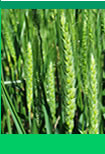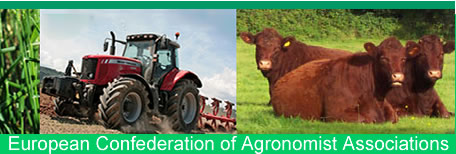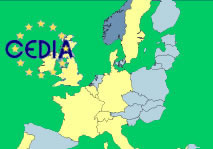


|
Presentation
by Sean Gaule President of Cedia
To Conaf National Congress Reggio Emilia, Italy 22 September 2010 I would like
to thank you president and your association CONAF for the kind invitation
to your National Congress. I am always very pleased to visit Italy.
I am very honoured to represent Cedia here today. So I know a little bit your beautiful country and its excellent food and beverages. For several years I have been involved with ASA, The Agricultural Science Association, in Ireland, serving on its council, and as its President in the 2001/2002 period. I am now completing
my second year as president of Cedia. For those of you not familiar
with Cedia – Over the years a wide range of topics and issues have been addressed by Cedia to include International professional exchanges, Job services and employment, Continuous professional development, Professional qualifications and graduate mobility, A charter for the European Agronomist has also been developed, in addition a number of conferences have been hosted. The last major such conference was hosted in Leuven in 2009, in cooperation with the European Life Sciences Universities. The conference on that occasion addressed models for successful collaboration and partnerships of purpose between universities, businesses and NGO’s in education, research and innovation. Job services
and career supports are now an important service provided by many
associations, Cedia has acted as a facilitator in this process.
My own association in Ireland now provide such a service based on
a model used by other Cedia members. The employment
situation for our members is now a cause for concern in a number
of European countries this was discussed at a Cedia meeting earlier
this year in Berlin and will again be discussed next week at our
meeting in Brussels. As you are well aware members of our profession are involved across the entire spectrum of the agricultural Industry, covering government Ministries, research, advisory, extension, education, training, agribusiness, rural organisations and the media, Developments in relation to Agricultural policy, the future of Agriculture, food security, food safety, higher agricultural education and research, rural development and the environment are all of key interest to our members The views of
professionals and their associations who have, made their careers
in the sector, and who have contributed in a substantial way in
the development of the Agri-food sector in Europe, have I believe,
to be recognised and acknowledged in Brussels in the policy formulation
process. The is an aim which I have being progressing successfully
over the past few years. I would now
like to make a few general comments on the current agricultural
situation. Many food companies
are reporting good growth and profits and optimism for the future.
George Lyon of the Agricultural Committee of the European Parliament and chairman of a committee which recently reported on CAP, in addressing the Agricultural Science Association in Ireland (10TH Sept 2010) stated:
In addition to CAP there are other important issues: 2) Significant environmental issues that are challenging both existing production and future expansion 3) Farmers will face increased volatility in Price 4) Exporters will face currency fluctuation and economic uncertainty in international markets. Where there are challenges there are opportunities
The topics, which you have chosen for your conference, are very appropriate and very relevant; I wish you well in your deliberations over the next few days. |